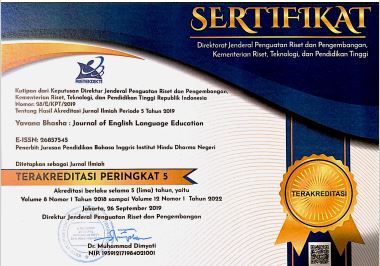THE CONTRIBUTION OF SELF-REGULATED LEARNING IN SHAPING HIGH SCHOOL STUDENTS’ ENGLISH PROFICIENCY
DOI:
https://doi.org/10.25078/yb.v7i2.3756Keywords:
English proficiency, language exposure, learning strategy, self-regulated learning (SRL)Abstract
The study addressed the influence of self-regulated learning (SRL) in English language learning. It involved 23 high school students attending a private school in Surabaya. The school implements bilingual language usage, incorporating both English and Indonesian. Therefore, most of the students demonstrated high fluency in English, as evidenced by their effortless communication during class activities. The students completed a scale and open-ended questionnaire regarding self-regulated learning and participated in an English proficiency test. The data were analysed using simple regression analysis. The finding suggests that self-regulated learning did not predict students’ English proficiency. Instead, according to students’ open-ended responses, the study found that students’ English proficiency was highly influenced by their exposure to the language naturally without structured learning strategies. Future studies should explore a more thorough assessment of students’ self-regulated learning levels and their connection with English proficiency, particularly in similar contexts.








